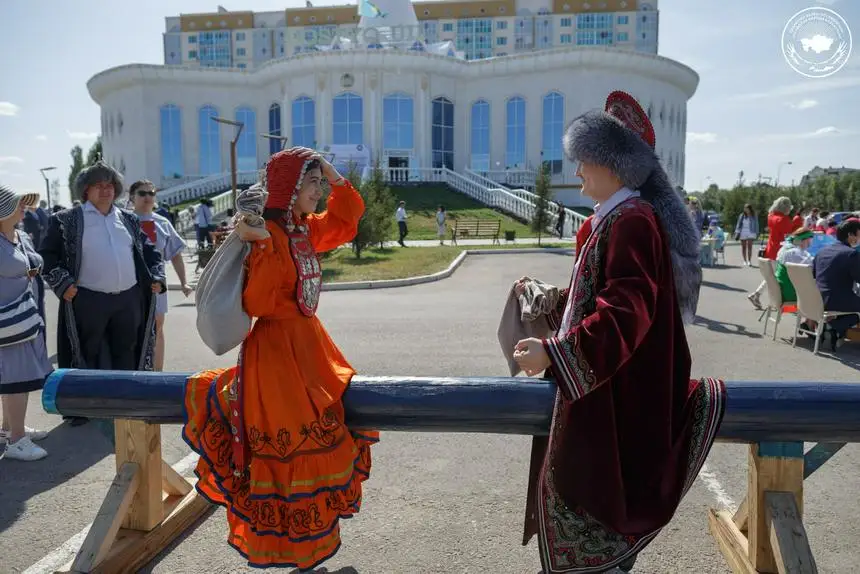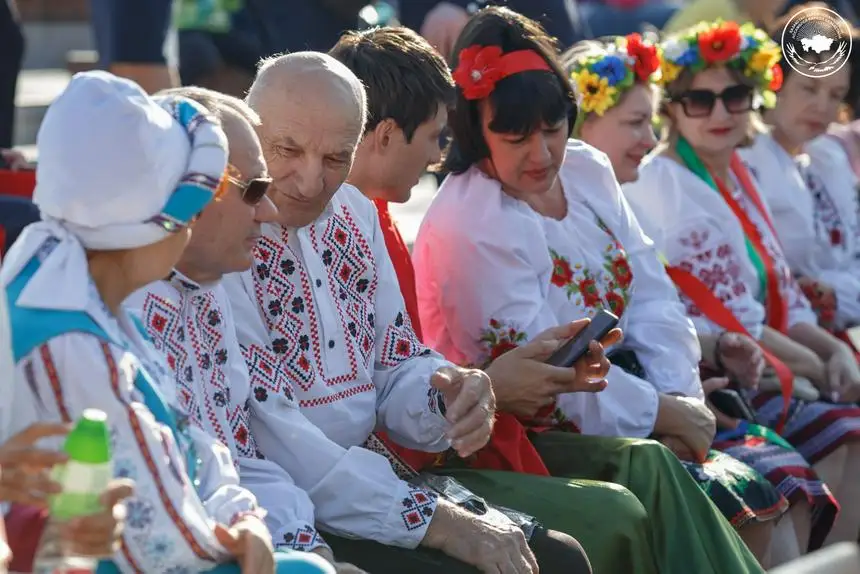Kazakhstan celebrates the Day of Gratitude, a centuries-old tradition of kindness, mercy, and good faith

Unity in diversity is the principle on which Kazakhstan, home to over 19 million people and at least 130 different ethnicities, has built its strong inter-ethnic and inter-religious agenda.
March 1 is the date that was chosen not by coincidence. March 1 is when the Assembly of People of Kazakhstan was established in 1995 to become a consultative and advisory body to the President of Kazakhstan, composed of representatives from various ethnic, cultural, and religious groups living in Kazakhstan.
The assembly is responsible for promoting inter-ethnic harmony, preserving the cultural diversity of Kazakhstan, and facilitating the integration of all ethnic groups into Kazakhstan’s society.
«This holiday embodies everlasting values of friendship, kindness, and solidarity, which are deeply rooted in our national identity. This Day of Gratitude reminds us that our people have preserved unity and solidarity in the hardest times, remained committed to high humanistic ideals, and have always shown mercy and compassion,» said President of Kazakhstan Kassym-Jomart Tokayev in his congratulatory statement today.

Photo credit: pavlkraimuz.kz
Mutual support and responsibility of every citizen for a common future has acquired a «special meaning,» he said, at a time when the world is facing unprecedented global challenges, and the country itself is in the midst of large-scale transformations,
«I am convinced that by strengthening the national unity, we can overcome difficulties and build a fair and prosperous Kazakhstan,» he said.
What is the reasoning behind the Day of Gratitude?
The Day of Gratitude reflects the historical events that Kazakhstan has witnessed over the past century. The events of the twentieth century significantly affected the nation.
Many ethnicities found themselves departed to Kazakh steppes under the harsh policies of the Soviet regime. In the 1930s-1950s, Kazakhstan was one of the Soviet Union countries affected by the policies of forced deportations carried out by the Soviet authorities.
The enormous migration flow came at a time when the tragic page of history for the Kazakh people has still been fresh. Between 1928 and 1938, a sharp and significant decline in the Kazakh population was caused by collectivization, Asharshylyq (famine), and Stalinist political repression.
According to historical records, it is estimated that between 1920 and 1954, over 1.5 million people were deported to Kazakhstan from various regions of the Soviet Union, including ethnic groups such as Germans, Chechens, Ingush, Kalmyks, Crimean Tatars, among others.

Photo from open sources
In 1936, the first Soviet deportation of the Poles and Germans took place, followed by the deportation of the Koreans from the Far East in 1937. At the same time, Kurds, Armenians, and Turks were deported from the southern borders of the Soviet Union to Kazakhstan.
The most significant deportation occurred during World War II when Stalin ordered the deportation of entire national groups, including the Chechens and Ingush in 1944 and the Crimean Tatars in 1944-1945. These groups were accused of collaborating with the Nazis, and their deportation was collective punishment.
It is difficult, however, to provide an exact number of people who were deported to Kazakhstan during the Soviet period as official records are incomplete, and some data was deliberately destroyed or suppressed by the Soviet authorities.

Man and woman playing national game. Photo credit: assembly.kz
Yet, it is clear that the policy of forced population transfers and deportations significantly impacted Kazakhstan's demographic and social makeup and continues to shape the country's history and identity today.
The essence of the Day of Gratitude lies in the kindness and mercy Kazakhs showed to people, welcoming them with warmth and compassion, despite their own challenging circumstances.
There are numerous stories of how Kazakhs shared their last loaf of bread and lent a helping hand to people for whom Kazakhstan was a new country back then.
Generations later, many Germans, Koreans, Poles, and Jews, among many deported ethnicities, call Kazakhstan home.
«An elderly Kazakh placed them in a room in one of the houses. Ignatsiy found his family after 3-4 days, but his health deteriorated badly. A day later, the grandfather died. He was buried by local aksakals [elderly people] near a large cotton field. Sofia and her small children were left alone. It seemed like the end of the world and starvation ahead. But soon, people began coming into their room, speaking in Kazakh that they did not understand. Each one brought something to eat - meat, flatbread, kurt [dried milk] and some dried fruit. Such visits continued all the time. The Kazakhs welcomed the Polish family as they shared a piece of bread with them,» wrote Anatoliy Grib from Semei, sharing the story of his grandfather Ignatsiy Grib in a documentary collection on the stories of deportations published by the Archive of the President of Kazakhstan in 2019.

People celebrating the Constitution Day. Photo credit: assembly.kz
Today’s relevance of the Day of Gratitude
Gennady Shipovskikh, a deputy of the Senate, an upper house of the Kazakh Parliament, said the holiday is «very important and special» for all people in Kazakhstan.
«On this day, representatives of all ethnic groups express their gratitude to the Kazakh people. Once, the Kazakh people have shown their generosity and help during a difficult winter period,» he said in a comment for this story.
Heroes of today should also be thanked, said the deputy.
«We would like to thank the doctors who helped us stay safe during the pandemic, the firefighters who rushed to our aid in an emergency, and the members of the military who keep our country safe. As the head of state said, every citizen who serves the country is a hero. So we are grateful to our ordinary citizens,» he added.

For Vladimir Chepel, a chief specialist at the Qapal rural district’s municipality in the Zhetysu region, Gratitude Day is a «sign of respect for shared history and appreciation for the sacred Kazakh land.»
«For me, this holiday is a day of endless gratitude to the Kazakh land and Kazakh people. Because we can say that the Kazakh people shared their last bread, regardless of nationality and religion. Other ethnic groups trapped by fate and finding shelter on Kazakh soil are extremely grateful to the Kazakh people. They found warmth and shelter,» said Chepel.
An inter-ethnic peace and accord is an aspect that characterizes Kazakhstan well and its people. It is also something the nation should cherish and protect, given the geopolitical turmoil and the ever-growing confrontation between states. Yet, it can also serve as a model for other countries seeking to build multi-ethnic and multi-cultural societies.